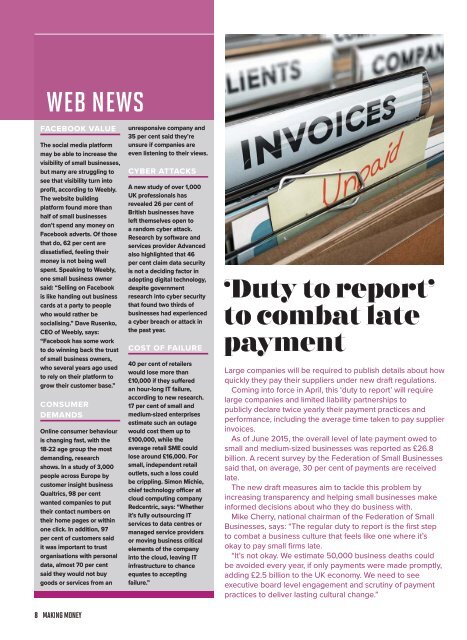Money Making
2kn6ojl
2kn6ojl
Create successful ePaper yourself
Turn your PDF publications into a flip-book with our unique Google optimized e-Paper software.
WEB NEWS<br />
FACEBOOK VALUE<br />
The social media platform<br />
may be able to increase the<br />
visibility of small businesses,<br />
but many are struggling to<br />
see that visibility turn into<br />
profit, according to Weebly.<br />
The website building<br />
platform found more than<br />
half of small businesses<br />
don’t spend any money on<br />
Facebook adverts. Of those<br />
that do, 62 per cent are<br />
dissatisfied, feeling their<br />
money is not being well<br />
spent. Speaking to Weebly,<br />
one small business owner<br />
said: “Selling on Facebook<br />
is like handing out business<br />
cards at a party to people<br />
who would rather be<br />
socialising.” Dave Rusenko,<br />
CEO of Weebly, says:<br />
“Facebook has some work<br />
to do winning back the trust<br />
of small business owners,<br />
who several years ago used<br />
to rely on their platform to<br />
grow their customer base.”<br />
CONSUMER<br />
DEMANDS<br />
Online consumer behaviour<br />
is changing fast, with the<br />
18-22 age group the most<br />
demanding, research<br />
shows. In a study of 3,000<br />
people across Europe by<br />
customer insight business<br />
Qualtrics, 98 per cent<br />
wanted companies to put<br />
their contact numbers on<br />
their home pages or within<br />
one click. In addition, 97<br />
per cent of customers said<br />
it was important to trust<br />
organisations with personal<br />
data, almost 70 per cent<br />
said they would not buy<br />
goods or services from an<br />
unresponsive company and<br />
35 per cent said they’re<br />
unsure if companies are<br />
even listening to their views.<br />
CYBER ATTACKS<br />
A new study of over 1,000<br />
UK professionals has<br />
revealed 26 per cent of<br />
British businesses have<br />
left themselves open to<br />
a random cyber attack.<br />
Research by software and<br />
services provider Advanced<br />
also highlighted that 46<br />
per cent claim data security<br />
is not a deciding factor in<br />
adopting digital technology,<br />
despite government<br />
research into cyber security<br />
that found two thirds of<br />
businesses had experienced<br />
a cyber breach or attack in<br />
the past year.<br />
COST OF FAILURE<br />
40 per cent of retailers<br />
would lose more than<br />
£10,000 if they suffered<br />
an hour-long IT failure,<br />
according to new research.<br />
17 per cent of small and<br />
medium-sized enterprises<br />
estimate such an outage<br />
would cost them up to<br />
£100,000, while the<br />
average retail SME could<br />
lose around £16,000. For<br />
small, independent retail<br />
outlets, such a loss could<br />
be crippling. Simon Michie,<br />
chief technology officer at<br />
cloud computing company<br />
Redcentric, says: “Whether<br />
it’s fully outsourcing IT<br />
services to data centres or<br />
managed service providers<br />
or moving business critical<br />
elements of the company<br />
into the cloud, leaving IT<br />
infrastructure to chance<br />
equates to accepting<br />
failure.”<br />
‘Duty to report’<br />
to combat late<br />
payment<br />
Large companies will be required to publish details about how<br />
quickly they pay their suppliers under new draft regulations.<br />
Coming into force in April, this ‘duty to report’ will require<br />
large companies and limited liability partnerships to<br />
publicly declare twice yearly their payment practices and<br />
performance, including the average time taken to pay supplier<br />
invoices.<br />
As of June 2015, the overall level of late payment owed to<br />
small and medium-sized businesses was reported as £26.8<br />
billion. A recent survey by the Federation of Small Businesses<br />
said that, on average, 30 per cent of payments are received<br />
late.<br />
The new draft measures aim to tackle this problem by<br />
increasing transparency and helping small businesses make<br />
informed decisions about who they do business with.<br />
Mike Cherry, national chairman of the Federation of Small<br />
Businesses, says: “The regular duty to report is the first step<br />
to combat a business culture that feels like one where it’s<br />
okay to pay small firms late.<br />
“It’s not okay. We estimate 50,000 business deaths could<br />
be avoided every year, if only payments were made promptly,<br />
adding £2.5 billion to the UK economy. We need to see<br />
executive board level engagement and scrutiny of payment<br />
practices to deliver lasting cultural change.”<br />
8 MAKING MONEY


